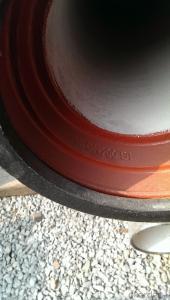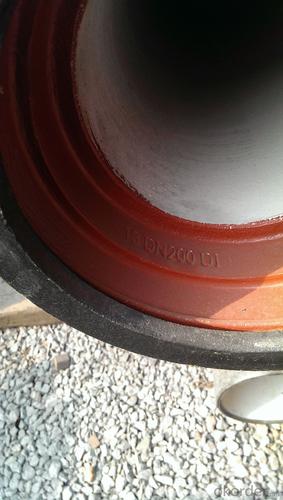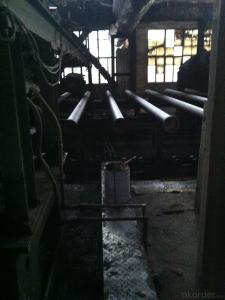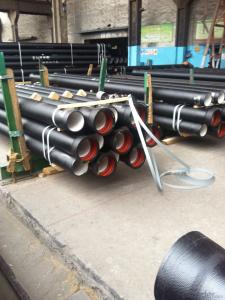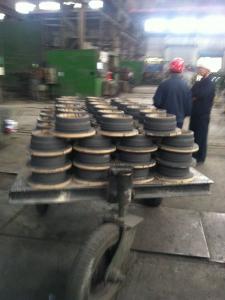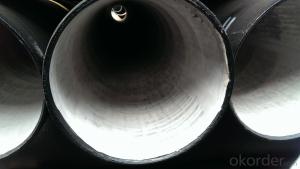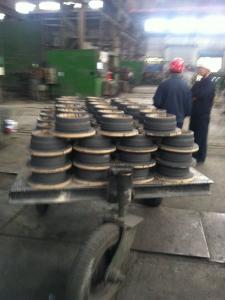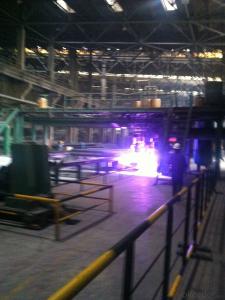DUCTILE IRON PIPES PIPE FITTINGS K7 CLASS DN500
- Loading Port:
- Tianjin
- Payment Terms:
- TT OR LC
- Min Order Qty:
- 25 m.t
- Supply Capability:
- 30000 m.t/month
OKorder Service Pledge
OKorder Financial Service
You Might Also Like
Material : Ductile Cast Iron
Size Range : DN 80mm to DN 2000mm
Unit Effective Length : 6m or 5.7m
Manufacture Standard: ISO 2531:1998/ EN 545:2006/EN 598:2007
Annual capacity : 200,000 tons
Coating Exterior: Zinc 130g/m2 according to ISO 8179-1 and bitumen coating 70 microns.
Cement Interior: Portland Cement/ High Alumina Cement/ Sulphate Resisting Cement Lining according to ISO 4179
Special requirements on external coating and internal lining can be applied
We also provide accessories such as SBR/EPDM rubber gaskets, lubricant paste, pipe caps, PE sleeves, etc.
Additional Parts:
Each pipe is strictly inspected according to related standard to ensure permanently high performance.
Easy Installation at site and service free for life
Long Service Lifespan
Quotation will arrive you within 24hours once we get your inquiry.
We guarantee offering you a competitive price.
A copy of original inspection reports of pipes will be offered after shipment.
Photos of loading process will be sent to the customer after shipment effect.
We will follow-up the delivery progress after shipment effect and update to the customer on weekly basis.
- Q: The difference between ductile iron pipe and UPVC drain pipe
- UPVC tube or rigid polyvinyl chloride pipe, U-PVC pipe, is a kind of strong corrosion resistance, acid and alkali salt oil medium erosion, light quality, has certain mechanical strength, good hydraulic conditions, convenient installation, but easy to aging, high temperature resistant, but can not withstand the impact, applied to the domestic water system, DN50 pipe connection DN65, using a ring connected with the above.
- Q: Can ductile iron pipes be used in potable water systems?
- Yes, ductile iron pipes can be used in potable water systems. Ductile iron is a suitable material for water distribution systems as it has excellent durability, strength, and corrosion resistance. It is commonly used in potable water systems due to its ability to withstand high water pressure and its long service life. Additionally, ductile iron pipes are also approved by various national and international standards for use in potable water applications.
- Q: What is the relationship between continuous cast iron pipe and ductile iron pipe?
- Cast iron pipes are divided into continuous cast iron pipes and centrifugal cast iron pipes according to different casting methods. They are divided into gray cast iron pipes and ductile iron pipes according to different materials.
- Q: What's the difference between cast iron pipe and steel pipe?
- Steel tube (Steel pipe) production technology development began in the bicycle manufacturing industry, the rise of the early nineteenth Century during the oil development, the two world war ships, boilers, aircraft manufacturing, manufacturing of power boiler after the Second World War, the development of chemical industry of petroleum and natural gas drilling and transportation, will effectively promote the the yield and quality of varieties, the development of steel tube industry.
- Q: Can ductile iron pipe be used for mining applications?
- Yes, ductile iron pipe can be used for mining applications. It is commonly used in mining operations due to its high strength, durability, and resistance to corrosion. Ductile iron pipe can withstand the harsh conditions and demanding requirements of mining, making it a suitable choice for transporting water, slurry, and other substances in mining operations.
- Q: Principles for the antiseptic treatment of ductile iron pipes
- The principle that the antiseptic treatment of ductile iron pipes must be complied with is that.1. internal and external surface coating shall be kept clean, remove rust and impurities2. after coating on the inside and outside surface, the coating should be even and smooth, firm and firm, and shall not be abnormal because of climate change3. coating for water delivery should be insoluble in water, no peculiar smell, harmful impurities content
- Q: What is the expected deflection range for ductile iron pipes?
- Several factors, such as pipe diameter, wall thickness, soil conditions, and installation methods, can affect the expected deflection range for ductile iron pipes. Compared to materials like PVC or concrete pipes, ductile iron pipes generally have a higher deflection capacity. For ductile iron pipes with smaller diameters (up to 12 inches), the typical expected deflection range is around 2-3% of the pipe diameter. In other words, a 12-inch ductile iron pipe could potentially deflect by approximately 0.24-0.36 inches. On the other hand, larger diameter ductile iron pipes (greater than 12 inches) can have a slightly higher expected deflection range, ranging from 2-5% of the pipe diameter. For instance, a 24-inch ductile iron pipe could potentially deflect by approximately 0.48-1.2 inches. It is important to remember that these values are general estimates and should be confirmed with the manufacturer's specifications or engineering design guidelines specific to a particular project. Furthermore, following proper installation techniques and backfilling practices is crucial to ensure the structural integrity of the pipe and prevent excessive deflection.
- Q: How do ductile iron pipes handle ground settlement near construction foundations?
- Ductile iron pipes are renowned for their effectiveness in handling ground settlement near construction foundations. Their flexible nature enables them to withstand ground movement without suffering severe damage or failure. When the ground settles near construction foundations, it exerts pressure on the surrounding infrastructure, potentially causing shifts in the soil. Ductile iron pipes have the advantage of absorbing and distributing this pressure, minimizing the risk of pipe breakage or deformation. A significant factor contributing to the resilience of ductile iron pipes is their high tensile strength. This strength enables the pipes to maintain their structural integrity even under substantial external forces. Consequently, they can endure ground settlement without experiencing fractures or cracks. Moreover, ductile iron pipes possess a high level of flexibility. This flexibility allows them to adapt to minor ground movements and accommodate shifts in the soil without compromising their functionality. The pipes can bend slightly without breaking or causing leaks, ensuring a continuous flow of fluids and preventing disruptions to the construction project. Additionally, ductile iron pipes are commonly installed with appropriate bedding and backfill materials. This ensures that the pipes have a stable and secure foundation, minimizing the risk of movement and settlement. The use of these materials also helps distribute the load exerted on the pipes more evenly, further enhancing their ability to handle ground settlement. All in all, ductile iron pipes are an excellent choice for construction projects that involve concerns about ground settlement. Their strength, flexibility, and proper installation techniques allow them to effectively handle ground movement near construction foundations, resulting in reliable and long-lasting infrastructure.
- Q: Are ductile iron pipes resistant to biological growth?
- Indeed, ductile iron pipes exhibit a general resistance to biological growth. Ductile iron, a robust and enduring substance, finds widespread application in water and sewage systems. Its sleek exterior hampers the proliferation of bacteria, fungi, and other microorganisms that foster biological growth. Moreover, ductile iron pipes frequently receive protective linings or coatings, for instance, cement mortar or epoxy, which heighten their resistance to biological growth. Nevertheless, it is crucial to acknowledge that no material remains entirely impervious to biological growth, necessitating regular maintenance and cleansing of the pipes to ensure sustained resilience in the long run.
- Q: How can the steel plastic composite pipe be connected with the cast iron pipe?
- Use stainless steel clamps to connect.
Send your message to us
DUCTILE IRON PIPES PIPE FITTINGS K7 CLASS DN500
- Loading Port:
- Tianjin
- Payment Terms:
- TT OR LC
- Min Order Qty:
- 25 m.t
- Supply Capability:
- 30000 m.t/month
OKorder Service Pledge
OKorder Financial Service
Similar products
Hot products
Hot Searches
Related keywords
